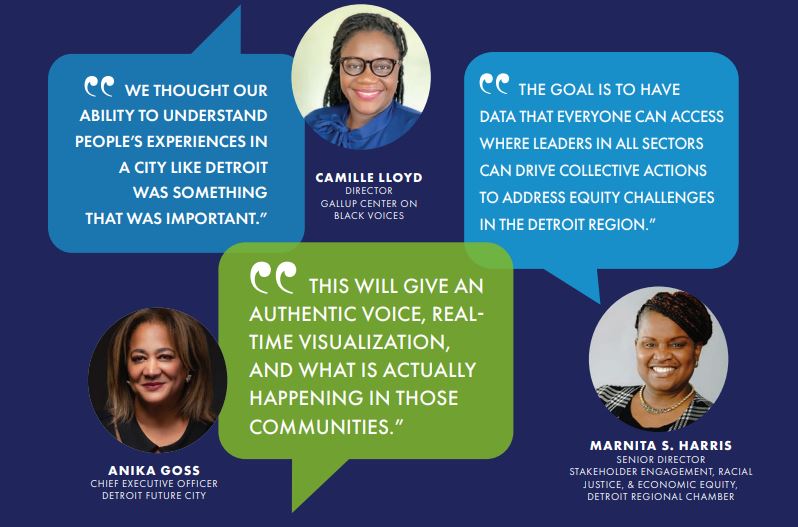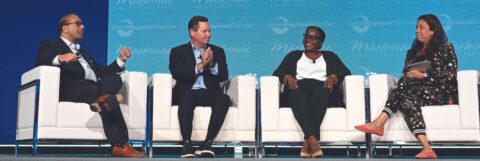By Trevor W. Coleman
To accurately gauge the life experiences of Detroiters, the Gallup Center on Black Voices has engaged in a first-of-its-kind survey that specifically seeks to understand their ambitions, hopes, and life experiences. It will also provide data that can serve as a catalyst for collective action that attempts to improve well-being outcomes across the city and help close the racial equity gap.
Americans, in general, have long expressed ambivalence toward polls and other surveys and their ability to assess their views accurately. This has been a particularly thorny issue among African Americans, who often voiced skepticism over polls and surveys of their communities.
This is due primarily to the experiences where their views were too often ignored, downplayed, and distorted out of context. Or the results ignored the impact of structural racism and even cultural incompetency in framing the questions.
However, Gallup Center on Black Voices Director Camille Lloyd said these concerns were, in fact, a catalyst for creating this new poll and their collaboration with local organizations to ensure its accuracy.
“We wanted to work with Detroit as one of our pilot cities,” she said. “When you think about the rich history of Detroit, and from a historical perspective on the things that we were measuring around equity and the changes that have happened – we thought our ability to understand people’s experiences in a city like Detroit was something that was important.”
The Gallup Center on Black Voices survey was executed as a regional effort, including the Detroit Regional Chamber and the Racial Equity Blueprint Group, which worked with Gallup to tailor the survey instrument specifically to meet the needs of Detroiters and the tri-county region.

The survey started in the fall of 2022 and ran through January 2023 and looked at questions that relate to people’s lived experiences around the key research areas of justice, jobs, work, economic opportunity, health and well-being, education, and community and environment.
“For this particular Detroit Resident Voices Survey, we sent out over 150,000 envelopes to a representative sample of folks living both in the city and the suburbs,” Lloyd said. “We received over 11,000 responses, with 6,243 from residents living within the city limits and 5,227 living in the metro area, the surrounding suburbs in Wayne, Macomb, and Oakland counties.”
Marnita S. Harris, Senior Director, Stakeholder Engagement, Racial Justice, and Economic Equity for the Detroit Regional Chamber, said Gallup’s 61 survey questions were developed from feedback gathered at local briefings held over the summer with the Racial Equity Blueprint Group, various community organizations, and funders.
She emphasized that the survey is part of the Chamber’s racial justice and economic equity work to improve well-being outcomes and drive collective action to close equity gaps.
“The survey will provide data on how residents view the quality of their lives, services offered and rate key daily experiences, including insight into Black Detroiters’ perceptions, feelings, desires, and life experiences,” Harris said.
“The goal is to have data that everyone can access where leaders in all sectors can drive collective actions to address equity challenges in the Detroit Region,” she said.
“The impact from the initiative will be measured annually to gauge the impact of efforts.”
Anika Goss, Chief Executive Officer of Detroit Future City and a member of the Racial Equity Blueprint Group, agreed and noted that Black people in Detroit are constantly researched and used for extracting stories and data, often without many contributions from or back to those communities.
“This will give an authentic voice, real-time visualization, and what is actually happening in those communities,” she said.
“Detroit is this nation’s largest Black city per capita,” Goss said. “So, where better to be able to obtain and acquire a survey that could begin to align data and information with other communities where Black people are also living, learning, thriving, or not?”
“Detroit will be in a leadership role for that, which is an incredible opportunity for us. Not only locally but nationally.”
Trevor W. Coleman is a former editorial writer and columnist for the Detroit Free Press.

